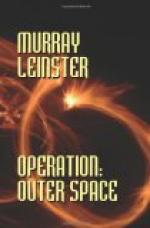There followed some ninety-six hours of pure tedium. After the first accelerating blasts, the rockets were silent. There was no weight. There was nothing to hear except the droning murmur of unresting electric fans, stirring the air ceaselessly so that excess moisture from breathing could be extracted by the dehumidifiers. But for them—if the air had been left stagnant—the journey would have been insupportable.
There was nothing to see, because ports opening on outer space were not safe for passengers to look through. Mere humans, untrained to keep their minds on technical matters, could break down at the spectacle of the universe. There could be no activity.
Some of the passengers took dozy-pills. Cochrane did not. It was against the law for dozy-pills to produce a sensation of euphoria, of well-being. The law considered that pleasure might lead to addiction. But if a pill merely made a person drowsy, so that he dozed for hours halfway between sleeping and awake, no harm appeared to be done. Yet there were plenty of dozy-pill addicts. Many people were not especially anxious to feel good. They were quite satisfied not to feel anything at all.
Cochrane couldn’t take that way of escape. He lay strapped in his chair and thought unhappily of many things. He came to feel unclean, as people used to feel when they traveled for days on end on railroad trains. There was no possibility of a bath. One could not even change clothes, because baggage went separately to the moon in a robot freight-rocket, which was faster and cheaper than a passenger transport, but would kill anybody who tried to ride it. Fifteen-and twenty-gravity acceleration is economical of fuel, and six-gravity is not, but nobody can live through a twenty-gravity lift-off from Earth. So passengers stayed in the clothes in which they entered the ship, and the only possible concession to fastidiousness was the disposable underwear one could get and change to in the rest-rooms.
Babs Deane did not take dozy-pills either, but Cochrane knew better than to be more than remotely friendly with her outside of office hours. He did not want to give her any excuse to tell him anything for his own good. So he spoke pleasantly and kept company only with his own thoughts. But he did notice that she looked rapt and starry-eyed even through the long and dreary hours of free flight. She was mentally tracking the moonship through the void. She’d know when the continents of Earth were plain to see, and the tints of vegetation on the two hemispheres—northern and southern—and she’d know when Earth’s ice-caps could be seen, and why.
The stewardess was not too much of a diversion. She was brisk and calm and soothing, but she became a trifle reluctant to draw too near the chairs in which her passengers rode. Presently Cochrane made deductions and maliciously devised a television commercial. In it, a moon-rocket stewardess, in uniform and looking fresh and charming, would say sweetly that she went without bathing for days at a time on moon-trips, and did not offend because she used whoosit’s antistinkum. And then he thought pleasurably of the heads that would roll did such a commercial actually get on the air.




